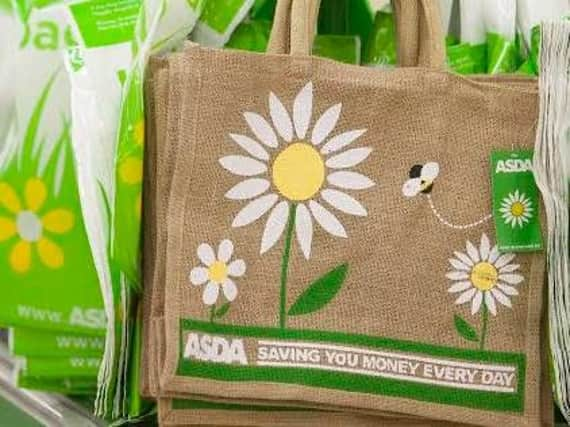Asda overtakes Sainsbury's to become UK's No. 2 supermarket


Sainsbury’s market share fell from 15.8 per cent to 15.3 per cent in the 12 weeks to March 24, whilst Leeds-based Asda's market share edged down from 15.6 per cent to 15.4 per cent.
Fraser McKevitt, consumer head of retail and consumer insight at Kantar, said: "From 2003 to 2015, Asda was ahead of Sainsbury's.
Advertisement
Hide AdAdvertisement
Hide Ad"It's been a 15 year battle between the two retailers. The margins are very fine here."
Kantar said that Asda is attracting more affluent shoppers.
"Asda's growth is coming from two things. Their core shoppers are shopping there more frequently which would suggest they are liking what they are seeing at the moment on the shelves," said Mr McKevitt.
"Asda is attracting more upmarket shoppers, perhaps people who have not been served so well by Asda so well in the past. It is managing to appeal more widely which maybe links to its current advertising campaign of everything under one roof."
Kantar said that despite being overtaken by Asda in main store sales, Sainsbury’s remains the biggest seller of food and drink out of the two retailers and these figures do not include Argos.
Advertisement
Hide AdAdvertisement
Hide AdSainsbury's £12bn merger with Asda is currently being considered by the Competition and Markets Authority, which gave an initial view last month that the deal should be blocked in the absence of the sale of a large number of stores, or even one of the brands. A final report is due by April 30.
Elsewhere, discount grocer Aldi has achieved a record market share with over 13 million households shopping there in the past 12 weeks – more than at Morrisons.
Aldi saw its sales increase by 10.6 per cent, helping it to a new record high market share of 8 per cent. Bradford-based Morrisons saw its market share slip slightly from 10.4 to 10.3 per cent.
Mr McKevitt said: "Aldi had 13.1 million shoppers and Morrisons had 12.9 million over the 12 weeks.
Advertisement
Hide AdAdvertisement
Hide Ad"Obviously that doesn't translate into market share terms because typically people spend less per item when they go into Aldi because that's the nature of it being a discounter.
"We know that the number of people shopping in a retailer is a very strong indication of how popular it is, so it is quite a landmark. It shows how Aldi are marching ahead so maybe we're heading towards a "big five" rather than a "big four".
Tesco is the UK's biggest grocer, followed by Asda, Sainsbury's and then Morrisons. Traditionally they have been called the "big four" grocers.
Kantar said that Morrisons' shoppers bought fewer items, although it attracted an extra 40,000 shoppers.
Advertisement
Hide AdAdvertisement
Hide AdMr McKevitt said: "It's hard to know exactly where that's coming from, but there is quite a noticeable drop in Morrisons' average basket sizes. That could mean that shoppers are choosing to spend it elsewhere. It could be at Asda, Aldi and Lidl.
"Morrisons, although they still promote more than everyone else in the market, are cutting back on promotions. Of course one function of promotions is to encourage people to put extra items in the basket."
The latest Kantar data suggests that shoppers are cutting back on their spending.
Year-on-year supermarket sales growth over the 12 weeks to March 24 slowed to 1.4 per cent - the slowest rate since March last year - in part due to the late Easter and Mother's Day falling outside the reported period, Kantar said.
Advertisement
Hide AdAdvertisement
Hide AdKantar said that shoppers have already spent £146m on Easter eggs this year, while 42 per cent of households have bought hot cross buns.
Consumers are continuing their pressure on retailers over single-use plastics with 21 per cent of fruit, vegetable and salad items being sold loose over the past 12 weeks. Sales of loose fruit and vegetables are growing twice as quickly as packaged produce.
Kantar’s data showed Tesco’s sales rose 0.5 per cent in the period and it remained the clear market leader with a share of 27.4 per cent.
Analysts at Nielsen also reported a slowing in grocery spending, to 1.2 per cent in March from 2.5 per cent the month before.
Advertisement
Hide AdAdvertisement
Hide AdNielsen attributed the slowdown to several factors, including the increased costs of living from rises in energy and fuel prices to the forthcoming increase in council tax, while extended uncertainty over Brexit negotiations also appeared to be causing shoppers to tighten their grocery budgets.
Mike Watkins, Nielsen's UK head of retailer insight, said: "We can see that the last few weeks have continued to be challenging for retailers. However, there should be brighter times ahead, with Easter on the horizon bringing attractive seasonal promotions to encourage shoppers to spend more on confectionery, snacks and drinks.
"If this is accompanied by warm spring weather and more clarity over the status of Brexit, this will help to kick-start growth for the big supermarkets and boost sales in time for summer."